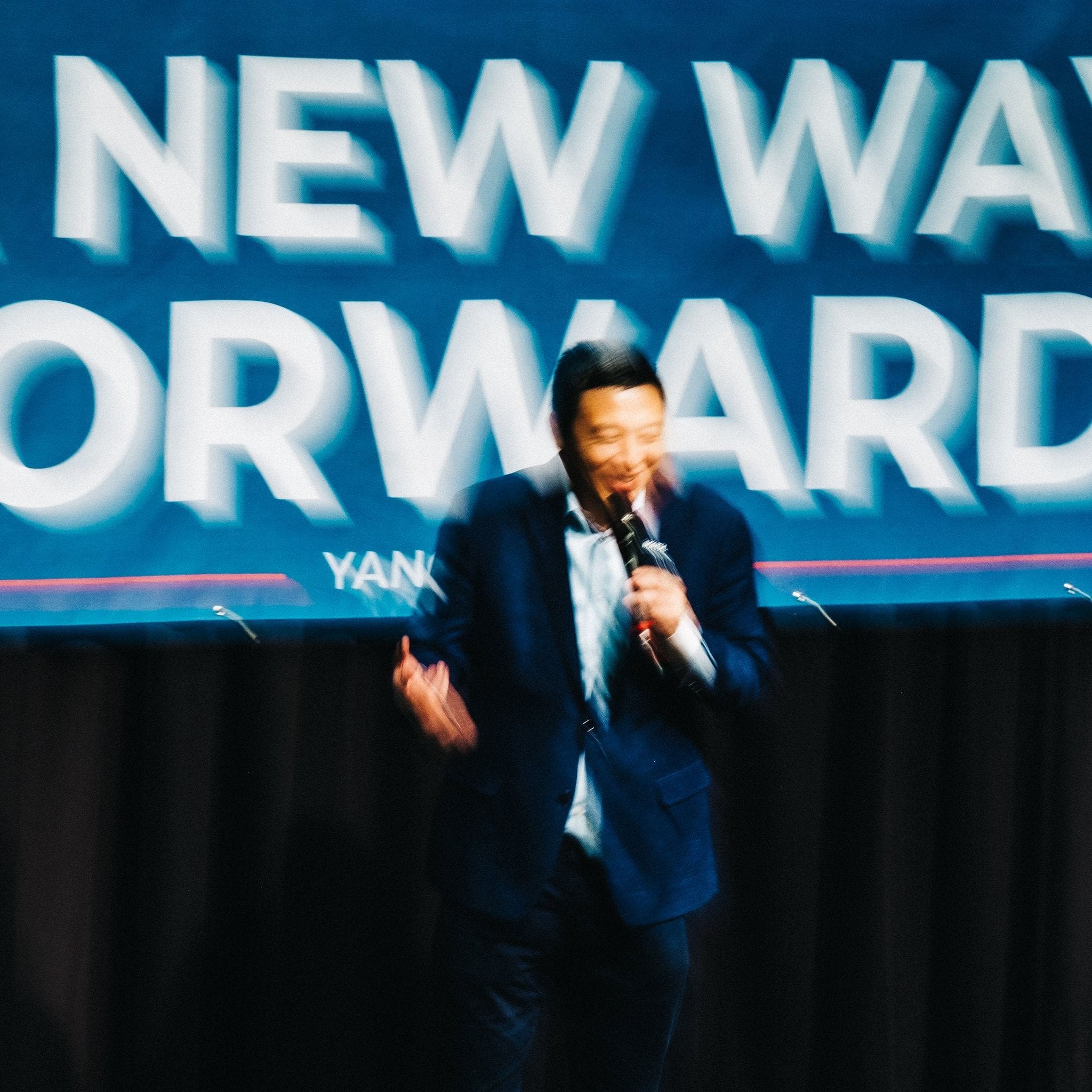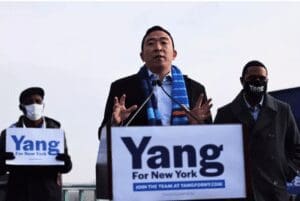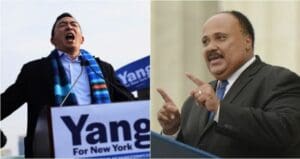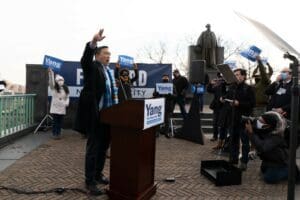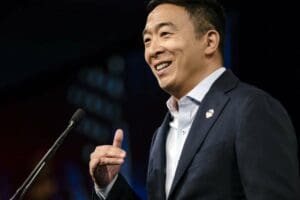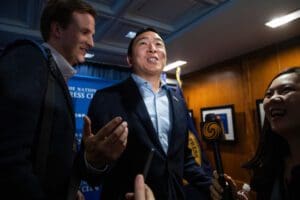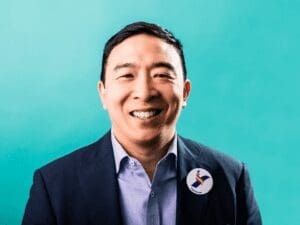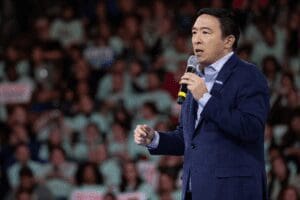It was New Year’s Eve, and I had decided to spend it with Andrew Yang. A self-described “Asian man who’s good at math,” Mr. Yang had raised an impressive $16.5 million in the fourth quarter of 2019 for his presidential campaign. Despite being newly flush, the campaign didn’t hold its shindig in a Napa Valley wine cave or at Gramercy Tavern, but in a fluorescent-lit room above a bar in Nashua, N.H.
The party looked like nothing so much as a high school dance if you had banned the bullies. There was a modest buffet of meatballs, spanakopita, Ritz crackers and Cheddar cheese. The D.J., a boomer with trousers that badly need hemming, could have been your chemistry teacher bouncing to Cardi B.
Now, a few days away from the Iowa caucus, Mr. Yang has outlasted more than a dozen candidates, including three senators and two governors. He came in first among Democrats in the Iowa Youth Straw Poll on Tuesday. Next week, he’ll be back on the debate stage.

He remains a very long shot: National polls have him consistently in the second tier, right next to Amy Klobuchar. Still, conventional wisdom would say that Andrew Yang should be nowhere this close to the American presidency.
I went to New Hampshire because I wanted to understand how a political rookie with what seemed like little going for him beyond a signature proposal of free money and relentlessly upbeat online fans had gotten this far. What does the URL candidate’s campaign look like IRL?
That night, the Yang Gang, as the candidate’s fans proudly call themselves, was a happy crowd of gamers, former goth girls, Burning Man enthusiasts, sci-fi geeks, students, coders and stoners. When Mr. Yang dropped a “Lord of the Rings” joke — “It’s like the Eye of Sauron is closing in!” he said of his momentum in the race — they erupted in laughter. Hardcore Yang voters are not cool. And that is exactly their, and his, appeal.
Among the partygoers on New Year’s Eve were Jackie and Dave Farrell, former Bernie Sanders supporters who own a deli in Caldwell, N.J. Mr. Farrell wore a handmade knitted beanie stitched with the words “Yang,” “Math,” “Vote” and “2020”; Ms. Farrell had a pink Yang Gang baseball hat over her blue hair and a copy of the candidate’s best seller, “The War on Normal People,” in her purse.

They fell in love inside an online role playing game called HoboWars. It’s hard to imagine anyone at a Joe Biden event with that kind of meet-cute. “He actually sold me a guild,” Ms. Farrell told me. “It’s sort of like a gang. Like a Yang gang.”
Talk to anyone in the Yang Gang for a few minutes and they’ll inevitably tell you how they got Yanged. The story almost always begins with a younger person telling an older person to Google Andrew Yang. Which is exactly what happened with the Farrells.
In August, a 23-year-old employee in the deli approached Ms. Farrell to ask whom she was supporting. “I was like: ‘Bernie, I guess. I supported him in 2016,’” she recalled. “And he goes, ‘Why haven’t you Googled Andrew Yang yet?”
So she did. “I literally stayed up till 4 a.m. that night watching videos.”
Have you ever been the target of a Twitter mob? It’s about as pleasant as a Brazilian wax in slow motion. The one thing that brings a small measure of comfort when you are in the digital cross hairs is the following assertion: The internet is not real life.
It is true, at least for the time being, that a horde of pixels cannot transform itself into a horde of people. But the lie that there is a bright line between the online world and the “real” one has been well and truly debunked. Just ask any middle-school girl shamed for an Instagram post, or any adult fired because of a bad tweet, or any Democrat hoping to oust Donald Trump and become the 46th president of the United States.
Bernie Sanders may be fueled by his zealous fans on social media, but of all the Democrats running for president, the web means the most to Andrew Yang. Without it, his candidacy simply wouldn’t exist.
It’s a classic underdog story: a political unknown, ignored by the mainstream media, sidestepping the pundits who had considered him a punchline. “In the early days there weren’t many people in cable news clamoring to have me on their shows,” he told me over bubble tea on a recent afternoon in his Manhattan campaign headquarters. “And so you seek out people who can reach lots of Americans.”
Those people were the ones with podcasts.
“What launched us was Sam Harris,” said Mr. Yang of his June 2018 appearance on Mr. Harris’s show “Making Sense.” It put him on the map: “I was invited to speak at the Wing Ding in Iowa” — a major Democratic fund-raising event — “because one of the people there was a Sam Harris fan.”
Mr. Harris introduced him to Joe Rogan, a mixed martial arts color commentator who hosts one of the most popular podcasts in the country. (Disclosure: I’ve also appeared on his show.) “Joe Rogan was the game changer,” Mr. Yang said. “We raised tens of thousands of dollars a day for awhile there and a million bucks in a week.”
But it isn’t simply that Mr. Yang cleverly used new platforms to his advantage. Sure, the podcasts gave him a big boost, but lots of politicians have used new media to expand their reach: Franklin Roosevelt commandeered the radio; Team Obama mastered the email blast; President Trump tears up Twitter.
Mr. Yang’s outsize success shows that the people who insist that Rachel Maddow has more influence over the American electorate than Mr. Rogan are lying to themselves about where cultural power in America is actually located.
What Mr. Yang understands is that the old rules no longer apply — and that flouting those rules is an energizing strategy. But while Donald Trump burned the whole house down, Andrew Yang is dunking on the system with a big smile.

That’s how he gets onstage at a Democratic debate, points out the ridiculousness of the artifice — “We’re up here with makeup on our faces and our rehearsed attack lines, playing roles in this reality TV show” — and walks away with one of the most talked-about moments of the night despite having had the least talking time.
His appeal is a powerful reminder that the animating political conflict of our era may not be left versus right, but establishment versus insurgency.
The Yang campaign prides itself on the heterodoxy of its supporters. “I poll 18 percent among college Republicans,” Mr. Yang told me. “I’ve got a higher appeal among independents, libertarians and even some disaffected Trump voters than Joe Biden by the numbers, than Bernie Sanders by the numbers.” One of his campaign slogans is “Not Left. Not Right. Forward.”
The writer Wesley Yang has suggested that the in-between nature of Asian-Americans — the way they are often regarded neither as white nor as people of color — allows them “to say and do things that white liberals are now afraid to say and do, which is to stand up for certain fundamental values.”
When you consider Mr. Yang’s positions on some of the touchiest aspects of the culture war and imagine his views coming out of the mouth of a Michael Bennet or a Pete Buttigieg, you can easily see the truth of this insight.
For instance: He’s glad that America has become “less of a monoculture.” (When he was a kid, he says, his own “efforts to be American included things like joining the wrestling team”; he was terrible at the sport.) But, he added, “I think there’s a middle ground where you can’t just say America is nothing and everybody run off and do your own thing.” It’s important, he said, to have a “common cultural context and even — and this will be very controversial — a common language of expression.”

I spoke to some of his many Asian-American supporters, and this resonated with them. Michael Chen, a 19-year-old Drexel student at one of the New Hampshire town hall events, said he appreciated that Mr. Yang, whose immigrant father grew up in a house with a dirt floor on a peanut farm, is not running on his identity: “You can be Asian-American, you can be black American, you can be Latino-American, but the common denominator is American. That’s who he is.”
Mr. Chen was there with his dad, Jack. The elder Mr. Chen calls himself a “Yang junkie” but insists being Asian has “little to do with it.” What animates him is the practicality of Mr. Yang’s solutions.
Mr. Yang believes in talking to people he disagrees with. In April, he appeared on “The Ben Shapiro Show,” a no-go zone for those who buy into the new politics of contamination — that to sit next to a conservative like Mr. Shapiro is to tacitly endorse his ideas. “Thinking that I’m going to catch ideas from someone seems ludicrous to me,” he said.
Soon after the comedian Shane Gillis was hired by “Saturday Night Live,” it was revealed that he had used racial slurs on podcasts, including describing Mr. Yang with an anti-Semitic and racist epithet. Mr. Yang tweeted that he didn’t think Mr. Gillis should be fired, writing, “We would benefit from being more forgiving rather than punitive.” The show didn’t follow Mr. Yang’s advice.
I asked Mr. Yang, who ran one of the top test prep programs in the country before it was bought by Kaplan, about his views on affirmative action. Is Harvard doing to Asians in the 21st century what it did to Jews in the 20th?
“Harvard’s gonna Harvard,” he said.
He told me that he himself was rejected from the school — he wound up at Brown — though he was amply qualified. But “if you have any kind of perspective,” he said, you realize that “my life and my humanity depends on more than whether some institution decides to stamp my hand.”
“Arguing for higher representation of an already overrepresented group — at least according to population standards — would not be my first bone to pick,” he said. Instead, he asked why Harvard, a university with a $40 billion endowment, is “opening locations in Shanghai but not Ohio or Michigan.” The real question, he said, is, “Are you trying to advance our society or are you trying to advance global moneyed interests?”
On New Year’s Eve it occurred to me that, despite living in New York, which prides itself on being the most cosmopolitan city in the world, I had not been in a room with such a politically diverse group of people since Donald Trump was elected president.
If there is a typical Yang voter it is a former Bernie Sanders supporter who feels that Mr. Yang understands the challenges of the 21st century better than a 78-year-old socialist without a single app on his phone.
Mr. Yang supported Mr. Sanders in 2016, before voting for Hillary Clinton in the general election (“I’m pro-civilization,” he said). He understands why young voters are drawn to Mr. Sanders. “If you’re a young person you look up and say, ‘What have I experienced from this capitalist system?’ Corporate abuse, crashes, bailouts, greed, record levels of college debt.” But he insists the best actor to improve people’s lives is “not our government, it’s us.”
“Bernie’s saying, ‘Let’s stick it to the billionaires and all will be well,’” he said. “I’m saying, ‘We need to rewrite the code, we need to rewrite the software.’”
At a campaign stop in Manchester, N.H., I spoke with Sunny Payne, a 23-year-old Yang supporter who’d come in from Bangor, Me., and uses the pronoun they. “While I think Bernie Sanders is an amazing person,” they said, “he has had the exact same policy stances for literally decades.”

Amberly McCabe and Martin Raucher, both 29, are also former Sanders supporters. They drove 25 hours from St. Petersburg, Fla., and made sure not to cut anyone off on the highway, Ms. McCabe said, because there’s a Yang bumper sticker on their car and “we have to represent.”
Mr. Raucher is a disabled veteran and Ms. McCabe is an artist; they met through their passion: spinning fire. It wasn’t possible to twirl lit torches inside the party room, so Ms. McCabe had fashioned the next best thing: a handmade light-up Yang sign.
“With Yang I’m all about the ideas, the policies,” she said, above all, his proposal for a universal basic income of $1,000 a month.
“I need an oil change,” said Mr. Raucher, when I asked how they’d spend it. “And my roof is leaking.”
Just across the dance floor were Elasa and Russell Peterson, two former Trump voters who changed their registration — and moved states — to support Mr. Yang’s candidacy.
“Everyone I know is the broke-folk vote,” said Mr. Peterson. They are among them. Until recently they worked at a North Carolina Olive Garden. (“I got to where I hated breadsticks,” said Ms. Peterson.)

“Donald Trump stands up there and says, ‘Hey, we got to build the wall because the immigrants are coming over here and they’re stealing our jobs.’ And you know what? Because we’re all broke we’re all like: ‘It’s immigrants! Yeah! Let’s build the wall!’” Mr. Peterson said. “But then you hear Andrew Yang talk and he’s like, ‘You know what? It’s not immigrants. It’s automation.’ You go into Walmart, you don’t see immigrants. You see self-serve checkouts. It’s like a light bulb goes off. Like, ‘Wow, this makes sense.’”
It made so much sense that they moved in with Ms. Peterson’s sister in Vermont, 10 minutes from the New Hampshire border, so they could volunteer full time for the campaign and promote him on their YouTube channel.
“Everybody in our family has been Yanged. And they were all Trumpers,” Mr. Peterson said.
At a town hall event attended by some 300 people on New Year’s Day, the first question — so on-brand I almost assumed it was a plant — was about the metric system: “So, Mr. Make Americans Think Harder, can we count on President Yang to support the blessings of the metric system?”
The crowd laughed. Amazingly, Mr. Yang came back with a thoughtful answer about how the metric system is safer, not least because it is more accurate for micro-dosing baby medicine.
To hear Andrew Yang talk is to understand why it is possible for people like the Petersons to support him: Unlike the president, he never demonizes other Americans. “The differences between us are pretty trivial compared to the things we share in common. And that’s a fundamental message of the campaign: Able-bodied, special needs, white, black, old, young, rural, urban, we’re all going to get run over by this automation freight train,” he said. “We need to human up and stop focusing on relatively trivial distinctions.”

The villain is not Donald Trump, but a market rigged for Big Tech and against normal Americans.
In Mr. Yang’s framing of the 2016 election, Mrs. Clinton lost not because of the Electoral College or Russian bots, but because she fundamentally misunderstood the crisis facing America. “Donald Trump said he was going to make America great again. And what did Hillary Clinton say in response? America is already great,” Mr. Yang said. “That message did not work because the pain in our country is real.”
In other words: Donald Trump is the wrong answer to the right question. Mr. Yang believes he is the right one.
At each one of the four campaign stops I went to, he asked the crowd why President Trump won. The audience called out answers: The media. Russia. Racism. Hillary. Facebook. Twitter. James Comey.
No, said Mr. Yang. It’s because “we blasted away four million manufacturing jobs” through automation in states like Ohio, Michigan, Pennsylvania, Missouri and Iowa.
What happened to manufacturing is coming to retail, restaurants and even accounting and the law, Mr. Yang insists. While Mr. Sanders suggests a federal government job guarantee, and Joe Biden suggests turning coal miners into coders, Mr. Yang says that work as we have known it is over.
If we don’t change anything, I asked him, where will be 50 years from now?
Best-case scenario? “We will see inequality at a staggering scale that right now most Americans would find unthinkable.”
And in the worst case? “The collapse of the government in its current form, political break up, and societal dysfunction that results in mass riots and violence.”
It’s impressive that, for the most part, his good humor softens the bleak message he is conveying. It’s a vision of the future — one disputed as hysterical by many observers — that makes President Trump’s “American carnage” address look almost rosy by comparison.
I caught up with Sunny Payne this week. Hearing Mr. Yang in person “lit the fire under me,” they said as they drove around Anderson, S.C., after a day spent door-knocking for him. They’d just spent a week in Iowa before realizing that “I wanted to spread the message to black voters and communities of color and I realized the best place for me to do that was in South Carolina.”
They said they kept hearing the same story from voters: “I can’t care about climate change because I need to put food on the table. I have three jobs. I barely sleep.”
To these people, Sunny Payne said, $1,000 a month would be life-changing.
That’s the reason that the comedian Dave Chappelle has endorsed Mr. Yang. “The wealth disparity between me and my neighbors is immense; it’s heartbreaking,” said Mr. Chappelle, who lives in Ohio, but appeared alongside Mr. Yang on the campaign trail this week. “If you know a third of the people up the street can’t buy groceries, then you start to feel an imperative concern,” he said. “This is without irony or a punch line, I’m just telling you — this guy’s got some great ideas, you should check it out.”

So have I been Yanged?
I don’t know if a universal basic income is the best solution to the problem of inequality. I’m not particularly passionate about lowering the voting age to 16 or requiring police officers to get purple belts in jujitsu. I worry about whether someone with zero foreign policy experience can be the commander in chief.
But as Bernie Sanders sells class rage, Joe Biden promises normalcy and Elizabeth Warren pushes a social progressivism so perfectly doctrinaire it seems tailored for five kids at Oberlin, Andrew Yang’s cheerful iconoclasm is refreshing.
If getting Yanged means that I believe that this curious campaign is a cause for that rarest thing in current American politics — hope — and that Mr. Yang is modeling how to harness the populist energy that otherwise threatens to tear us apart, then count me #YangGang.











